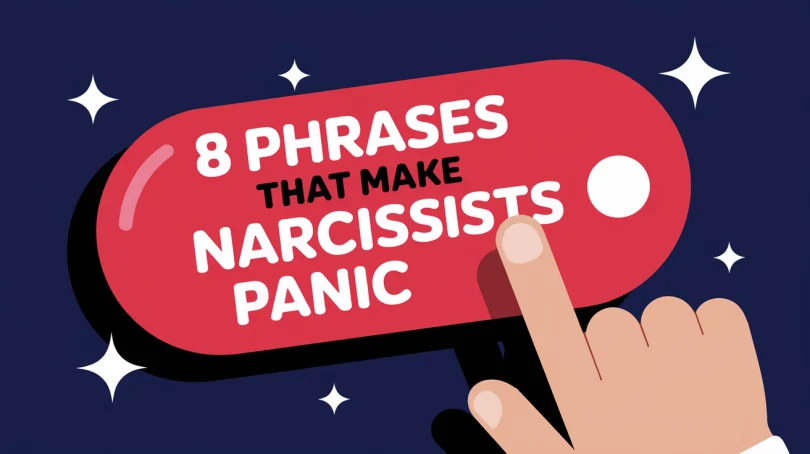The narcissist in your life thinks they’re untouchable until they hear these eight specific phrases. Today, I’m sharing something powerful: eight phrases that can completely change the dynamic between you and the narcissist in your life. But first, a word of caution: use these phrases wisely and only when you feel safe to do so.
Why These Phrases Work
Before I reveal these eight powerful phrases, you need to understand why they work and how to use them safely. Let’s start with why words are a narcissist’s kryptonite. You see, narcissists build their entire world on words, their lies, their manipulation, their gaslighting. But when you use the right words, you can crack their carefully constructed façade. Think of it as finding the exact code to unlock a door. These phrases hit them where they’re most vulnerable: their inflated ego.
The Psychology Behind the Triggers
Now, here’s the fascinating psychology behind these triggers. Narcissists operate on a foundation of three core beliefs: they’re special, they’re always right, and everyone else exists to serve them. When you use specific phrases that challenge these beliefs, it creates what psychologists call a “narcissistic injury.” It’s like pulling the rug out from under their feet, disrupting their sense of superiority.
Timing and Safety
But timing is everything. Use these phrases when:
- You’re in a safe environment.
- You have emotional support available.
- You’re financially independent.
- You’ve already set up boundaries.
Never use them when:
- The narcissist is being physically aggressive.
- You’re financially dependent on them.
- You’re isolated from support systems.
- Your gut tells you it’s not safe.
This brings me to the most crucial part: safety precautions.
Safety Precautions
Before you use any of these phrases, you need to have a support system in place.
- Document all interactions.
- Keep important documents and belongings secure.
- Have an exit strategy ready.
- Save some emergency money, if possible.
Remember, these phrases are tools for empowerment, not weapons for revenge. They’re about protecting yourself, not hurting them. Now that you understand the foundation, let’s dive into the first set of phrases that can help you regain control.
First Set of Phrases to Regain Control
Phrase Number 1: “I don’t need your approval.”
This simple but powerful phrase hits right at the core of a narcissist’s control tactics. Why does it work so well? Because narcissists believe they’re the ultimate authority in every relationship. They think their approval is like oxygen, something you can’t live without. Let me share a real example: One of my clients, Sarah, used this phrase when her narcissistic mother tried to criticize her career choice. Her mother said, “You’ll never succeed in that field without my guidance.” Sarah calmly responded, “I don’t need your approval for my career choices.” The result? Her mother was completely thrown off balance.
Be Prepared: When you use this phrase, a narcissist might:
- Try to list all the times you “needed” them.
- Attempt to belittle your independence.
- Make threats about withdrawing their support.
- Launch into a rage about your “ungratefulness.”
To deliver this phrase effectively, keep your tone neutral not aggressive, not defensive. Just state it as a simple fact, like you’re saying, “The sky is blue.”
Phrase Number 2: “That’s your opinion, not a fact.”
This phrase is your weapon against gaslighting. Narcissists love to present their opinions as universal truths. They’ll say things like, “Everyone knows you’re too sensitive,” or “Nobody would ever want to hire you.” Use this phrase when they’re trying to force their distorted reality on you. For example, when they say, “You always ruin everything,” respond with, “That’s your opinion, not a fact.” It’s like holding up a mirror to their manipulation.
Expect: When you use this phrase, they might:
- Get visibly frustrated.
- Try to gather evidence to “prove” their point.
- Bring up past mistakes.
- Attempt to recruit others to support their view.
Stay firm. Don’t get drawn into defending yourself; just keep calmly repeating the phrase if needed.
Related Topics:
9 ways to deal with toxic people
10 Reasons Narcissists Cut You Off Abruptly
How Narcissists Use SELF-AWARENESS as a Manipulation Tactic
7 Tips for Dealing with A Covert Narcissist
5 Dark Mind Games Narcissists Use to Break You
Phrase Number 3: “I’m not responsible for your emotions.”
This is your shield against emotional manipulation. Narcissists are experts at making you feel responsible for their feelings. They might say, “You made me so angry,” or “It’s your fault I’m upset.” Understanding this manipulation is crucial—narcissists use their emotions as weapons, making you walk on eggshells. But here’s the truth: You’re not their emotional caretaker.
When You Use This Phrase: Narcissists typically:
- Escalate their emotional display.
- Accuse you of being cold or uncaring.
- Try to guilt-trip you with past situations.
- Attempt to “prove” how you caused their feelings.
To maintain this boundary, stay calm and firm. Don’t apologize for their feelings, keep your response consistent, and be prepared to repeat yourself. Setting this boundary isn’t about being cruel; it’s about taking care of your emotional well-being.
Next Set of Phrases to Stand Your Ground
Phrase Number 4: “I remember things differently.”
This is your go-to phrase when a narcissist tries to rewrite history. Gaslighting is their favorite tool, making you question your memories and sanity. But this simple phrase is like a shield against their reality distortion. Here’s why it’s so effective: instead of calling them a liar (which would escalate things), you’re simply stating your truth. It’s non-confrontational but firm. When they say, “You agreed to that last week,” or “That never happened,” you calmly respond, “I remember things differently.”
Expect: They might:
- Insists their version is the only truth.
- Try to find witnesses to support their version.
- Question your memory or mental state.
- Get frustrated when they can’t control your perception.
Stay emotionally detached; think of yourself as a neutral observer stating facts.
Phrase Number 5: “Your behavior is unacceptable.”
This is your strongest boundary-setting phrase. It’s direct and clear and leaves no room for manipulation. But timing is everything with this one. Use it when:
- Their behavior crosses clear lines.
- You’re in a safe environment.
- You have support available.
- You’re ready to enforce consequences.
Be Prepared: They might:
- Play the victim.
- Turn it back on, you.
- Have an explosive reaction.
- Try to minimize their behavior.
Always have an exit strategy ready when using this phrase, whether it’s leaving the room, ending the call, or having someone on standby.
Final Set of Powerful Phrases
Phrase Number 6: “I don’t owe you an explanation.”
This phrase breaks the exhausting cycle of constantly explaining yourself. Narcissists demand explanations to maintain control and find weak points in your decisions. When do you use it? Anytime they demand justification for your personal choices—whether it’s about your career, relationships, or even what you had for lunch. You don’t owe them an explanation.
The Aftermath Might Include:
- Accusations of being secretive.
- Claims about their “right to know.”
- Attempts to guilt-trip you.
- Spreading rumors about you.
Stay firm. Each time you avoid justifying yourself, you build stronger boundaries.
Phrase Number 7: “That doesn’t work for me.”
The beauty of this phrase lies in its simplicity: no explanations, no apologies, no room for argument. It’s like a stop sign for narcissistic demands. Why does it trigger them? Because:
- It doesn’t give them anything to argue against.
- It shows you’re making decisions independently.
- It provides no emotional fuel.
- It maintains clear boundaries.
Real Example: When they demand immediate responses to messages, simply reply, “That doesn’t work for me. I’ll respond when I’m available.”
Phrase Number 8: “I’m not competing with you.”
This final phrase is particularly powerful because it dismantles a narcissist’s favorite game: competition. They see everything as a contest they must win. When you say this, you’re refusing to play their game, challenging their worldview, maintaining your independence, and showing emotional maturity.
They Might Respond By:
- Trying harder to prove their superiority.
- Making comparisons more obvious.
- Accusing you of being “afraid” to compete.
- Attempting to force competition.
Stay steady with your response. Remember, you’re stepping out of their game entirely, not trying to win it.
How to Implement These Phrases Safely
Now that you have these powerful phrases, let’s talk about how to implement them safely and effectively. This is crucial because using these phrases isn’t just about saying the words; it’s about having a solid strategy behind them.
Creating Your Safety Plan
- Always trust your instincts if something feels unsafe, it probably is.
- Have an emergency bag ready with essential documents, some cash, and necessities.
- Know your safe exits from any location where you might encounter the narcissist.
- Save emergency numbers in your phone under unrelated names.
- Have a code word with trusted friends or family that signals you need help.
Building Your Support System
- Connect with at least three people you can trust completely.
- Join support groups online or in person where others understand your situation.
- Build relationships with neighbors who can be alert to concerning situations.
- Consider sharing your situation with your workplace security, if necessary.
- Have a therapist or counselor who understands narcissistic abuse.
Documenting Interactions
- Keep a detailed journal of all interactions, including dates and times.
- Save screenshots of messages and emails.
- Record conversations if it’s legal in your area.
- Note any witnesses present during interactions.
- Document any violations of boundaries or threatening behavior.
When to Seek Professional Help
- If you feel overwhelmed by anxiety or fear.
- When you notice physical symptoms from the stress.
- If the narcissist’s behavior is escalating.
- When you’re planning to leave the relationship.
- If you’re struggling to maintain boundaries.
- When children are involved in the situation.
Remember, these phrases are tools for empowerment, but they’re most effective when backed by a solid support system and safety plan. Start small, build your confidence, and always prioritize your safety above everything else. In my years of helping people navigate narcissistic relationships, I’ve seen that those who succeed are the ones who take these precautions seriously. You’re not just learning phrases; you’re building a foundation for your freedom and well-being.






